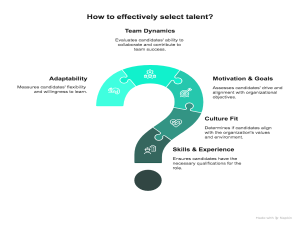From Good to Great: Elevating Your Interview

You've just finished an interview. You answered every question clearly, gave solid examples, and felt like you represented yourself well. You think, "That was a good interview." But what about the one that leaves the hiring manager genuinely excited? The one that makes them say, "We have to hire this person!" That's a great interview.
While a "good" interview gets you into consideration, a "great" interview secures the offer. Let's break down the crucial differences.
The "Good" Interview: Meeting Expectations
A good interview means you've successfully cleared the basic hurdles:
• Preparation: You've researched the company and the role, and you know your resume inside out.
• Clear Answers: You provide concise and relevant answers to questions, often using the STAR method effectively.
• Professionalism: You arrive on time (or log in early for virtual interviews), are dressed appropriately, and maintain respectful etiquette.
• Basic Questions: You ask a few generic questions at the end ("What's the team culture like?").
• Enthusiasm: You convey a general interest in the role and the company.
Essentially, a good interview means you've demonstrated that you can do the job and you're a reasonable candidate. You've met the minimum requirements and haven't given them any reasons to say "no."
The "Great" Interview: Exceeding Expectations and Making an Impact
A great interview goes beyond competence. It's about demonstrating value, foresight, and a genuine connection.
• Deep Understanding & Strategic Thinking:
◦ Good: Understands the job description.
◦ Great: Understands the company's challenges and opportunities related to the role. They don't just answer the question; they frame their answer within the context of the company's goals and how their skills will directly contribute to solutions. They might even proactively identify a potential problem or opportunity and suggest how they'd approach it.
• Proactive Problem-Solving:
◦ Good: Answers behavioural questions with past examples.
◦ Great: Uses past examples not just to show what they did, but to illustrate their approach to problem-solving. They connect their past actions to future value for the interviewer's company. "In my last role, I tackled X problem [STAR], and given your current challenges with Y, I believe a similar approach could lead to Z outcome here."
• Curiosity & Insightful Questions:
◦ Good: Asks about team structure or day-to-day tasks.
◦ Great: Asks thought-provoking questions that demonstrate deep thought, genuine curiosity, and a strategic mindset. These questions might touch on industry trends, future company direction, or how this role impacts broader organizational goals. They show they're interviewing the company as much as the company is interviewing them.
• Cultural Fit & Authentic Personality:
◦ Good: States they are a "team player."
◦ Great: Naturally integrates examples that showcase their personality, values, and how they would truly thrive within the company's specific culture. They don't just say they're a team player; they tell a compelling story about how they resolved a conflict or championed a colleague, giving a tangible sense of their collaborative spirit. They reveal their authentic self, creating a memorable connection.
• Anticipation & Confidence:
◦ Good: Provides clear answers.
◦ Great: Anticipates potential follow-up questions or concerns and addresses them proactively. They speak with a quiet confidence that stems from both preparation and a deep belief in their own abilities. If they don't know something, they admit it gracefully and explain their process for finding solutions.
• Memorable Narrative:
◦ Good: Presents a series of factual points about their experience.
◦ Great: Weaves their experience into a compelling narrative, highlighting their unique journey, motivations, and what drives them. They tell stories that resonate and make them stand out from other candidates.
The Bottom Line
A good interview shows you're qualified. A great interview shows you're the solution. It leaves the interviewer not just impressed by your skills, but excited by the prospect of you joining their team and contributing immediately. It's about moving from being a mere applicant to becoming an indispensable future colleague.


